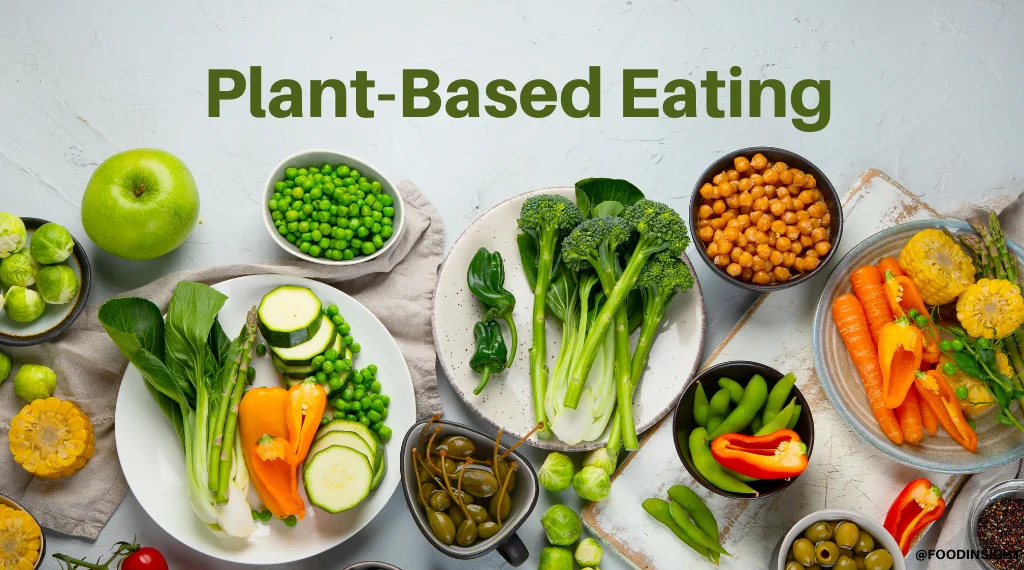Are These BBQ Sauces Really Plant-Based? We Investigated
Are These BBQ Sauces Really Plant-Based? We Investigated
Blog Article
Everything About Healthy Food: Benefits of Embracing Plant Based Alternatives
The conversation surrounding plant-based diet regimens has actually acquired significant interest recently. Many people are exploring the prospective health and wellness benefits, dietary advantages, and ecological influences related to these nutritional options. As people come to be much more conscious of their food's impact on health and sustainability, inquiries develop regarding the usefulness of taking on such a way of living. What details changes can one anticipate, and exactly how might these selections improve not only individual wellness yet likewise the planet's future?
Recognizing Plant-Based Diet Regimens
Although many individuals connect plant-based diet regimens primarily with vegetarianism or veganism, these diets can include a large range of consuming patterns that focus on whole, minimally processed plant foods. Such diet regimens usually consist of fruits, vegetables, whole grains, nuts, beans, and seeds, while restricting or removing animal items. This versatility enables individuals to customize their nutritional selections according to nutritional needs and individual preferences. Some may embrace a mostly plant-based diet while still sometimes consuming meat or milk, commonly referred to as a flexitarian approach. The focus stays on incorporating more plant foods, which can result in a diverse selection of dishes and flavors. Comprehending these various analyses of plant-based consuming is vital for valuing its availability and charm in contemporary food society.
Wellness Benefits of Plant-Based Foods
The wellness benefits of plant-based foods are substantial, using a nutrient thickness benefit that sustains total health. Research study indicates that these foods can improve heart health and wellness and play a crucial function in reliable weight management. By incorporating a lot more plant-based choices, people might enhance their dietary choices and advertise long-term health and wellness.
Nutrient Density Benefit
Nutrient density plays a necessary role in the health and wellness advantages of plant-based foods, making them a compelling selection for those seeking a well balanced diet plan. Plant-based foods, such as fruits, veggies, vegetables, nuts, and entire grains, are commonly rich in essential vitamins, minerals, and antioxidants while being reduced in calories. This high nutrient thickness permits individuals to consume fewer calories while still fulfilling their nutritional needs. In addition, these foods are loaded with nutritional fiber, promoting digestive system health and wellness and aiding in weight administration. By including nutrient-dense plant-based choices, customers can boost their overall wellness, support their body immune systems, and lower the risk of chronic conditions. Inevitably, the nutrient density of plant-based foods underscores their significance in a health-conscious lifestyle.
Heart Health Renovation
:max_bytes(150000):strip_icc()/45259671-97112006e572444a996dbbacfd4b8bed.jpg)
Weight Monitoring Support
Along with promoting heart health and wellness, a plant-based diet regimen can considerably assist in weight administration. This dietary technique emphasizes entire foods such as fruits, veggies, legumes, nuts, and entire grains, which are typically lower in calories and greater in fiber contrasted to animal-based items. The high fiber material helps raise satiety, decreasing total calorie intake. Plant-based diet plans are usually rich in important nutrients while low in unhealthy fats, making it simpler to preserve a healthy and balanced weight. Research study shows that individuals who embrace a plant-based lifestyle tend to have lower body mass indexes (BMIs) and experience even more successful fat burning compared to those that consume meat-heavy diets. Subsequently, welcoming plant-based choices is a calculated selection for effective weight management
Nutritional Value of Plant-Based Active Ingredients
Plant-based active ingredients are abundant in vital nutrients, using a diverse range of vitamins, minerals, and anti-oxidants that add to overall health and wellness. A comparison of protein resources exposes that while pet items are commonly considered as superior, lots of plant-based options give ample healthy protein and various other advantageous compounds. Comprehending the nutritional value of these active ingredients can aid people make informed dietary choices.
Important Nutrients in Plants
Nutrient-rich components discovered in plants use a diverse range of crucial nutrients that add substantially to total wellness. These active ingredients are rich in vitamins A, C, and K, which sustain immune function, vision, and blood click this link clotting, specifically. On top of that, plants give essential minerals such as potassium, magnesium, and calcium, important for heart health and wellness, muscle mass function, and bone strength. The visibility of fiber in plant-based foods aids food digestion and promotes a healthy digestive tract microbiome. Anti-oxidants, located generously in fruits and vegetables, aid fight oxidative tension and decrease inflammation. Moreover, numerous plant foods are reduced in calories yet high in nutrients, making them an exceptional option for those seeking to preserve a healthy weight while making certain optimal nutrient intake.
Contrasting Healthy Protein Resources
Healthy protein sources differ substantially in their dietary profiles, with plant-based ingredients using special advantages. Unlike animal proteins, which typically contain hydrogenated fats and cholesterol, plant healthy proteins tend to be lower in these harmful components. Legumes, nuts, seeds, and entire grains are abundant in essential amino acids, fiber, vitamins, and minerals. Lentils provide high healthy protein material alongside substantial iron and folate, while quinoa is a total healthy protein, providing all 9 essential amino acids. In addition, plant-based proteins are usually gone along BBQ Sauces with by anti-oxidants and phytochemicals that sustain overall health. The change to plant-based protein resources not just boosts dietary consumption but also lines up with lasting nutritional practices, lowering environmental effect and promoting lasting health advantages.
Environmental Effect of Plant-Based Consuming
As awareness of environment adjustment expands, many people are discovering lasting nutritional options that can greatly lessen their environmental footprint. Plant-based eating has emerged as a substantial contributor to minimizing greenhouse gas discharges, which are mainly related to livestock production. The cultivation of fruits, grains, vegetables, and vegetables generally needs less resources, such as water and land, contrasted to animal farming. In addition, plant-based diet regimens can bring about lowered deforestation, as less land is required for grazing livestock or expanding animal feed. By shifting in the direction of plant-based options, consumers can sustain biodiversity and promote healthier environments. Generally, embracing plant-based consuming not only advantages personal health but also stands for an important step towards ecological sustainability and conservation initiatives.
Overcoming Common Misconceptions
While many individuals recognize the advantages of a plant-based diet, numerous mistaken beliefs commonly prevent them from fully embracing this lifestyle. A typical belief is that plant-based diet plans lack adequate healthy protein; nevertheless, countless plant resources, such as vegetables, nuts, and tofu, provide sufficient protein. In addition, some presume that this diet regimen is expensive, when in fact, staples like beans, rice, and seasonal vegetables can be fairly budget friendly. An additional false impression is that plant-based eating is extremely limiting, whereas it really offers a varied selection of foods and flavors. Ultimately, several stress that a plant-based diet might lead to deficiencies, yet with correct preparation, individuals can get all needed nutrients, including nutrients, while delighting in a large variety of tasty meals.
Tips for Transitioning to a Plant-Based Lifestyle
Making the shift to a plant-based way of living can be an improving experience, though it commonly calls for some guidance to browse the preliminary adjustments. First, people are encouraged to begin gradually, integrating even more fruits, vegetables, beans, and entire grains right into their dishes while reducing meat and dairy products consumption. Dish planning is important; preparing an once a week menu can help ease the change and protect against final unhealthy selections. Discovering brand-new recipes and cooking techniques can additionally keep and enhance the experience excitement regarding plant-based eating. Additionally, signing up with support system or neighborhoods can offer motivation and share beneficial tips. Remaining notified about nourishment assurances well balanced dishes, avoiding shortages while promoting a healthy, rewarding plant-based way of living.

Delicious Plant-Based Dish Concepts
Checking out delicious plant-based meal ideas can influence individuals to embrace a much more nutritious diet plan. One preferred alternative is a hearty quinoa salad, including cherry tomatoes, cucumber, and a vibrant lemon-tahini dressing. Another fave is a tasty lentil stew, packed with carrots, celery, and fragrant herbs, perfect for a comforting dinner. For morning meal, overnight go to this site oats made with almond milk, chia seeds, and topped with fresh berries provide a nourishing start to the day. Additionally, a vibrant vegetable stir-fry with tofu and a range of vibrant veggies can be a quick yet satisfying dish. Luscious avocado salute on whole-grain bread, sprinkled with seeds and seasonings, uses a straightforward yet savory snack. These dishes showcase the selection and richness of plant-based eating.

Regularly Asked Concerns
Can a Plant-Based Diet Offer Enough Protein?
The concern of whether a plant-based diet can offer sufficient healthy protein prevails. Numerous sources, including vegetables, nuts, seeds, and whole grains, can fulfill healthy protein needs effectively, sustaining a nourishing and balanced diet regimen for individuals.
Are Plant-Based Diet Plans Ideal for Kid?
The viability of plant-based diet plans for children relies on mindful preparation. Sufficient nutrients must be guaranteed, including healthy proteins, vitamins, and minerals. With correct assistance, such diet regimens can support healthy growth and growth in kids.
Exactly how Do I Eat Out on a Plant-Based Diet plan?
Dining out on a plant-based diet involves seeking restaurants with varied menus, requesting alterations, and discovering vegan-friendly alternatives. Preparation in advance and communicating nutritional choices can enhance the dining experience while keeping dietary selections.
What Prevail Irritants in Plant-Based Foods?
Usual irritants in plant-based foods consist of soy, gluten, nuts, and seeds - Plant Based Beef. People complying with a plant-based diet plan needs to recognize these allergens and review labels carefully to stay clear of adverse reactions and ensure secure usage
Can Plant-Based Diets Aid With Weight Loss?
Study suggests that embracing a plant-based diet plan may help with weight management due to its usually lower calorie density and greater fiber web content. This mix can boost satiety, aiding people manage their caloric intake efficiently. Several individuals associate plant-based diet regimens mostly with vegetarianism or veganism, these diets can include a broad array of consuming patterns that prioritize whole, minimally processed plant foods. Nutrient density plays an important role in the health benefits of plant-based foods, making them an engaging selection for those seeking a balanced diet. Plant-based diet regimens have been revealed to substantially enhance heart health, as they frequently have elements that support cardiovascular function. In enhancement to promoting heart wellness, a plant-based diet can considerably aid in weight management. An usual belief is that plant-based diet regimens lack sufficient healthy protein; nonetheless, numerous plant resources, such as beans, nuts, and tofu, give sufficient healthy protein.
Report this page